 W
WEggs are laid by female animals of many different species, including birds, reptiles, amphibians, a few mammals, and fish, and many of these have been eaten by humans for thousands of years. Bird and reptile eggs consist of a protective eggshell, albumen, and vitellus, contained within various thin membranes. The most commonly consumed eggs are chicken eggs. Other poultry eggs including those of duck and quail also are eaten. Fish eggs are called roe and caviar.
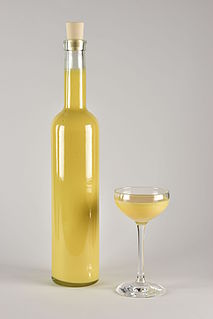 W
WAdvocaat or advocatenborrel is a traditional Dutch alcoholic beverage made from eggs, sugar, and brandy. The rich and creamy drink has a smooth, custard-like consistency. The typical alcohol content is generally between 14% and 20% ABV. Its contents may be a blend of egg yolks, aromatic spirits, sugar or honey, brandy, vanilla, and sometimes cream. Notable makers of advocaat include Bols, Darna Ovo Liker, DeKuyper, and Verpoorten.
 W
WReference Re Agricultural Products Marketing, [1978] 2 S.C.R. 1198 is a landmark constitutional decision of the Supreme Court of Canada on cooperative federalism where the Court unanimously upheld the validity of various Acts passed by the Parliament of Canada and the Legislative Assembly of Ontario for establishing a national agricultural marketing scheme agreed upon by both the federal and provincial governments.
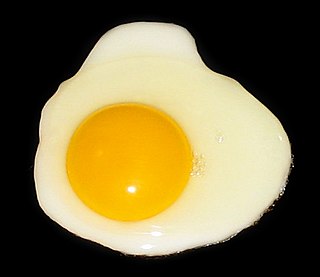 W
WEgg allergy is an immune hypersensitivity to proteins found in chicken eggs, and possibly goose, duck, or turkey eggs. Symptoms can be either rapid or gradual in onset. The latter can take hours to days to appear. The former may include anaphylaxis, a potentially life-threatening condition which requires treatment with epinephrine. Other presentations may include atopic dermatitis or inflammation of the esophagus.
 W
WAnt eggs refer to both the eggs and pupae of weaver ants eaten in several countries across Southeast Asia, especially Laos and Northeastern Thailand (Isan). They are high in protein and enjoyed for their sourness and pop when eaten along with soups, omelets, and salads.
 W
WCanadian Egg Marketing Agency v Richardson, [1998] 3 S.C.R. 157 is a decision of the Supreme Court of Canada on standing to challenge a law as a violation of the Constitution of Canada. The Court expanded the exception first established in R. v. Big M Drug Mart to allow corporations to invoke the Canadian Charter of Rights and Freedoms in civil litigation. The corporation had claimed rights to freedom of association and freedom of movement under section 2(d) and section 6 of the Charter.
 W
WChicken eggs are graded by size, for the purpose of sales. The egg shell constitutes 8–9% of the weight of the egg
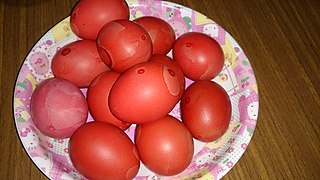 W
WChinese red eggs are bright pink coloured cooked chicken eggs. The eggs are first hard boiled before a wet red calligraphy paper is wiped over the eggs to create a pink coloring.
 W
WThe Draper Poultrymen and Egg Producers' Plant, located at 1071 East Pioneer Road in Draper, Utah, United States, is important in the history of Draper. Also known as the Draper Poultrymen Inc., as Draper Egg Producers Association, and as Intermountain Farmers Association, it was listed on the National Register of Historic Places in 2004.
 W
WEaster eggs, also called Paschal eggs, and Egg of Easter are eggs that are sometimes decorated. They are usually used as gifts on the occasion of Easter. As such, Easter eggs are common during the season of Eastertide. The oldest tradition is to use dyed and painted chicken eggs, but a modern custom is to substitute chocolate eggs wrapped in coloured foil, hand-carved wooden eggs, or plastic eggs filled with confectionery such as chocolate. However, real eggs continue to be used in Central and Eastern European tradition.
 W
WThe egg and wine diet is a fad diet that was popularized in 1964 and revived in 2018 on social media platforms.
 W
WEgg Beaters is a product marketed in the United States as a healthy substitute for whole eggs. It is a substitute for whole/fresh eggs that contains less cholesterol, but it is not an egg substitute. Egg Beaters is primarily egg whites with added flavorings, vitamins, and thickeners xanthan gum and guar gum. It contains real egg whites, but no egg yolks.
 W
WAn egg carton is a carton designed for carrying and transporting whole eggs.
 W
WAn egg coffee is a Vietnamese drink traditionally prepared with egg yolks, sugar, condensed milk and robusta coffee. The drink is made by beating egg yolks with sugar and coffee, then extracting the coffee into the half of the cup, followed by a similar amount of "egg cream" — egg yolks which are heated and beaten, or whisked.
 W
WEgg marking is a form of egg labelling that includes an egg code stamped on the egg itself. In the EU there is a producer code regulated by law since 2004. It allows consumers to distinguish free range eggs and organic farming eggs from the industrial caged hen production.
 W
WAn egg slicer is a food preparation utensil used to slice peeled, hard-boiled eggs quickly and evenly. An egg slicer consists of a slotted dish for holding the egg and a hinged plate of wires or blades that can be closed to slice.
 W
WAn egg spoon is a specialized spoon for use in eating boiled eggs. In comparison to a teaspoon it typically has a shorter handle and bowl, a more pointed tip and often a more rounded bowl. These characteristics are designed to facilitate the removal of an egg's contents from the shell, through a small hole in one end. For this purpose the egg spoon is intended to be easier to use than a teaspoon. In practice the difference can be unnoticeable, especially when eating a large egg. In consequence, boiled egg spoons are not common in either modern or antique flatware/cutlery services. Nevertheless, the diminutive size of a boiled egg spoon makes it well suited to small eggs.
 W
WEgg substitutes are food products which can be used to replace eggs in cooking and baking. Common reasons a cook may choose to use an egg substitute instead of egg(s) include having an egg allergy, adhering to a vegan diet or a vegetarian diet of a type that omits eggs, or having concerns about the level of animal welfare or environmental burden associated with the production of eggs. There is an growing movement to address some of these concerns via 3rd party certifications, though many labels in the industry remain confusing or intentionally misleading.
 W
WEgg substitutes are food products which can be used to replace eggs in cooking and baking. Common reasons a cook may choose to use an egg substitute instead of egg(s) include having an egg allergy, adhering to a vegan diet or a vegetarian diet of a type that omits eggs, or having concerns about the level of animal welfare or environmental burden associated with the production of eggs. There is an growing movement to address some of these concerns via 3rd party certifications, though many labels in the industry remain confusing or intentionally misleading.
 W
WThe Egg War is the name given to an 1863 conflict between rival egging companies on the Farallon Islands, 25 miles off San Francisco. It was the culmination of several years of tension between the Pacific Egg Company, which claimed the right to collect the eggs on the islands, and rival firms. The resulting violence claimed two lives, but left the Egg Company in sole control of the islands' eggs. Its victory was short-lived; the company sold the rights to use the islands in the late-1870s and the federal government removed all egging companies from the islands in 1881.
 W
WEggnog, historically also known as a milk punch or an egg milk punch when alcoholic beverages are added, is a rich, chilled, sweetened, dairy-based beverage. It is traditionally made with milk, cream, sugar, whipped egg whites, and egg yolks. Distilled spirits such as brandy, rum, whisky or bourbon are often a key ingredient.
 W
WEggshell membrane or shell membrane is the clear film lining eggshells, visible when one peels a boiled bird egg. Chicken eggshell membranes are used as a dietary supplement.
 W
WFree-range eggs are eggs produced from birds that may be permitted outdoors. The term "free-range" may be used differently depending on the country and the relevant laws, and is not regulated in many areas.
 W
WA full breakfast is a substantial cooked breakfast meal, often served in the United Kingdom and Ireland, that typically includes bacon, sausages, eggs, black pudding, baked beans, tomatoes, mushrooms, toast, and a beverage such as coffee or tea. It appears in different regional variants and is referred to by different names depending on the area. While it is colloquially known as a "fry up" in most areas of the UK and Ireland, it is usually referred to as a "full English", a "full Irish", "full Scottish", "full Welsh", "full Cornish", and "Ulster fry", in England, the Republic of Ireland, Scotland, Wales, Cornwall, and Northern Ireland, respectively.
 W
WThe Happy Egg Company is an American egg producer headquartered in Rogers, Arkansas. It is the first commercial egg producer in the U.S. to be certified by the American Humane Association.
 W
WManitoba (AG) v Manitoba Egg and Poultry Association [1971] S.C.R. 689 is a leading Supreme Court of Canada decision on the Trade and Commerce power under section 91(2) of the Constitution Act, 1867. The decision was the result of a growing political debate known as the "chicken and egg war" where Quebec and Ontario enacted protectionist legislation for the egg and poultry industry preventing Manitoba from selling their eggs and poultry products in those provinces. To much of the public's surprise the Court struck down a provincial statute regulating the marketing of eggs. The case somewhat contradicted the precedent case of Carnation Co. v. Quebec Agricultural Marketing Board, [1968] S.C.R. 238 which held that provincial law that has an incidental effect on other provinces is still valid.
 W
WOrganic egg production is the production of eggs through organic means. In this process, the poultry are fed organic feed. According to the United States Department of Agriculture, organic means that the laying hens must have access to the outdoors and cannot be raised in cages. Only natural molting can occur within the flock; forced molting is not allowed. Organic certification also requires maintenance of basic animal welfare standards.
 W
WOvo vegetarianism is a type of vegetarianism which allows for the consumption of eggs but not dairy products, in contrast with lacto vegetarianism. Those who practice ovo vegetarianism are called ovo-vegetarians. "Ovo" comes from the Latin word for egg.
 W
WPasteurized eggs are eggs that have been pasteurized in order to reduce the risk of food-borne illness in dishes that are not cooked or are only lightly cooked. They may be sold as liquid egg products or pasteurized in the shell.
 W
WA powdered egg is a fully dehydrated egg. Powdered eggs are made using spray drying in the same way that powdered milk is made. The major advantages of powdered eggs over fresh eggs are the reduced weight per volume of whole egg equivalent and the shelf life. Other advantages include smaller usage of storage space, and lack of need for refrigeration. Powdered eggs can be used without rehydration when baking, and can be rehydrated to make dishes such as scrambled eggs and omelettes.
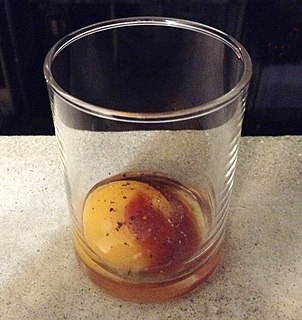 W
WA prairie oyster is a traditional beverage consisting of a raw egg, Worcestershire sauce, vinegar and/or hot sauce, table salt, and ground black pepper. Tomato juice is sometimes added, reminiscent of a Bloody Mary. The egg is broken into a glass so as not to break the yolk. The mixture is quickly swallowed. The unbroken yolk causes the drink to bear a texture similar to that of an oyster. The concoction has been referred to as a traditional cure for hangovers, and has appeared in media for decades.
 W
WQuail eggs are considered a delicacy in many parts of the world, including Asia, Europe, and North America. In Japanese cuisine, they are sometimes used raw or cooked as tamago in sushi and often found in bento lunches.
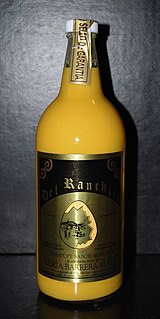 W
WRompope is an eggnog-like drink made with eggs, milk, and vanilla flavouring. The egg yolks impart a yellow hue to the emulsified beverage. It is a traditional drink known as such in Honduras, Costa Rica, Ecuador, Nicaragua, El Salvador, Guatemala, Belize and particularly in Mexico, where, it is believed to have been originally made in the convents of the city of Puebla, Mexico. The word rompope is a derivation of the word rompon, which is used to describe the Spanish version of eggnog that came to Mexico. The Spanish version utilizes rum as its main ingredient, hence the root of both rom-pon and rom-pope, but in Central America, Guatemala, Honduras and El Salvador, there is also a similar beverage known as rompopo. For example, Salcaja, in Guatemala, offers one known version of this rompope drink and in South America, the country of Chile has among its most popular drinks rompon and cola de mono or monkey's tail, the latter containing coffee, making it dark instead of yellow, but also containing the other ingredients commonly found in rompope.
 W
WSeparating eggs is a process, generally used in cooking, in which the egg yolk is removed from the egg white. This allows one part of the egg to be used without the other part, or each part to be treated in different ways. Recipes for custard call for egg yolks, for example.